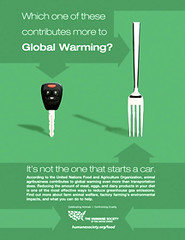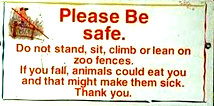According to a study released yesterday by Adweek and J. Walter Thompson (JWT), only 14 percent of those surveyed say they respect ad people.
Gasp! Sometimes, I am ad people. That’s me! (Well, sometimes anyway.) So maybe I need public relations help. Or perhaps some journalists might weigh in. Oh right, never mind.
With Mad Men on AMC capturing positive reviews and ad guys coming out of the woodwork to join some playful Ad Legends cameos, is it any wonder?
Maybe it’s because as niche sub-consultants who wear many hats, we don’t always see all the glam slam that is associated with the industry. I guess I’m still stuck on a concept my creative director knocked into my head years ago … “great advertising isn’t always about being clever, it’s hard work.”
I laughed at him then, but it didn’t take too long to find out he was right. Maybe not at the big firms, but certainly everybody I’ve worked with (including a couple of big firms). Take a ton of research, apply strategic communication, and just before you become so left brained you’ll never have a creative idea again, you push your thinking to the right and come up with something that conveys the right message to the right audience while being exciting enough to get noticed.
Here’s a reality check. The survey only accounts for 966 Americans in a random online survey. That’s not only a pretty slim number, but it was also conducted in an environment that is largely predisposed against advertising. And the real irony, the survey was conducted by an advertising agency.
What the survey does do is provide meaningful discussion points.
• 84 percent agree (strongly/somewhat), “Too many things are over-hyped now."
Just yesterday, I said buzz was not a measure. Maybe consumers agree.
• 74 percent agree, “The Internet helps me make better product choices."
This finding has social media pundits in a tizzy claiming consumers want authentic engagement. (As if social media was devoid of hype; as if pretending to be someone’s “friend” to sell them is somehow better than selling them something.)
• 72 percent agree, “I get tired of people trying to grab my attention and sell me stuff.”
Which is a tremendous irony in consumer behavior considering Harris Interactive research that suggests 100 percent the opposite.
• 52 percent agree, “There’s too much advertising — I would support stricter limits.”
These folks obviously need a trip here.
• 47 percent regard “Advertising as background noise.”
Bad advertising is background noise, you bet. Only about 10-20 percent of advertising is any good, and I’m being generous. Most ads, ironically, are company-dictated because, well, companies don’t trust ad people either.
And the list goes on. And on.
“The study significantly uncovers a basic disconnect between the ad industry’s ‘world view’ and that of its audience,” JWT reports. And that is probably the most truthful statement in the entire report.
As for the rest, even if we were to consider the sampling size to be valid, here’s the real rub in this report. Ad people might have only scored 14 percent as a repected profession, but they still beat national politicians and car salesmen. Lawyers only scored 19 percent and journalists (truth tellers) a dismal 26 percent. The ONLY two other professions even asked about were teachers and doctors, and they barely broke into the 70s.
Funny. Maybe advertisers are not the only ones using hype these days. That Adweek hyperbole headline really drew me in for a minute.
Hmmm ... maybe consumers are just not all that trusting anymore. Sometimes, I don’t blame them. (Hat tip: Recruiting Animal.)

Gasp! Sometimes, I am ad people. That’s me! (Well, sometimes anyway.) So maybe I need public relations help. Or perhaps some journalists might weigh in. Oh right, never mind.
With Mad Men on AMC capturing positive reviews and ad guys coming out of the woodwork to join some playful Ad Legends cameos, is it any wonder?
Maybe it’s because as niche sub-consultants who wear many hats, we don’t always see all the glam slam that is associated with the industry. I guess I’m still stuck on a concept my creative director knocked into my head years ago … “great advertising isn’t always about being clever, it’s hard work.”
I laughed at him then, but it didn’t take too long to find out he was right. Maybe not at the big firms, but certainly everybody I’ve worked with (including a couple of big firms). Take a ton of research, apply strategic communication, and just before you become so left brained you’ll never have a creative idea again, you push your thinking to the right and come up with something that conveys the right message to the right audience while being exciting enough to get noticed.
Here’s a reality check. The survey only accounts for 966 Americans in a random online survey. That’s not only a pretty slim number, but it was also conducted in an environment that is largely predisposed against advertising. And the real irony, the survey was conducted by an advertising agency.
What the survey does do is provide meaningful discussion points.
• 84 percent agree (strongly/somewhat), “Too many things are over-hyped now."
Just yesterday, I said buzz was not a measure. Maybe consumers agree.
• 74 percent agree, “The Internet helps me make better product choices."
This finding has social media pundits in a tizzy claiming consumers want authentic engagement. (As if social media was devoid of hype; as if pretending to be someone’s “friend” to sell them is somehow better than selling them something.)
• 72 percent agree, “I get tired of people trying to grab my attention and sell me stuff.”
Which is a tremendous irony in consumer behavior considering Harris Interactive research that suggests 100 percent the opposite.
• 52 percent agree, “There’s too much advertising — I would support stricter limits.”
These folks obviously need a trip here.
• 47 percent regard “Advertising as background noise.”
Bad advertising is background noise, you bet. Only about 10-20 percent of advertising is any good, and I’m being generous. Most ads, ironically, are company-dictated because, well, companies don’t trust ad people either.
And the list goes on. And on.
“The study significantly uncovers a basic disconnect between the ad industry’s ‘world view’ and that of its audience,” JWT reports. And that is probably the most truthful statement in the entire report.
As for the rest, even if we were to consider the sampling size to be valid, here’s the real rub in this report. Ad people might have only scored 14 percent as a repected profession, but they still beat national politicians and car salesmen. Lawyers only scored 19 percent and journalists (truth tellers) a dismal 26 percent. The ONLY two other professions even asked about were teachers and doctors, and they barely broke into the 70s.
Funny. Maybe advertisers are not the only ones using hype these days. That Adweek hyperbole headline really drew me in for a minute.
Hmmm ... maybe consumers are just not all that trusting anymore. Sometimes, I don’t blame them. (Hat tip: Recruiting Animal.)























